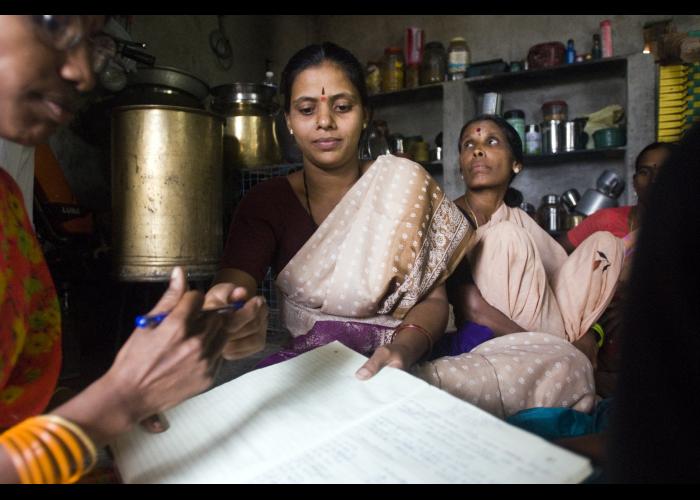The Power of Networks for Growing Women's Leadership in SMEs: The India Case
Introduction
Who: The Women’s Leadership in Small and Medium Enterprises (WLSME) program in India, implemented by CARE India in partnership with the Loyola Institute of Business Administration (LIBA), Chennai
 What: The program aims to promote women’s leadership and the sustainable growth of 210 women-owned and managed cashew processing SMEs throughout the cashew value chain. It also seeks to promote factors that contribute to a greater enabling environment. The overarching goal of the program is to learn and understand whether addressing the issues pertaining to human capital (agency), external constraints (relations), and social capital (structures) have an impact – either individually or in combination – on the success of women-operated SMEs.
What: The program aims to promote women’s leadership and the sustainable growth of 210 women-owned and managed cashew processing SMEs throughout the cashew value chain. It also seeks to promote factors that contribute to a greater enabling environment. The overarching goal of the program is to learn and understand whether addressing the issues pertaining to human capital (agency), external constraints (relations), and social capital (structures) have an impact – either individually or in combination – on the success of women-operated SMEs.
When: September 28, 2012 - September 27, 2015
Where: Panruti cluster of Cuddalore District, Tamil Nadu, India
Why: Only 7% of the total SMEs present in India are women-owned enterprises, and 89% of these are unregistered. Systemic barriers affect the entry and growth of women in the SME sector to begin with, and many women-run enterprises are small, informal, and receive little integration or support within the larger economic system. This in turn limits the ability of women to overcome some of the systemic constraints – and in effect reinforces them. Women workers and entrepreneurs, who make up the majority of those working in the cashew processing industry, form a fairly unique type of “cluster” in Panruti region, Cuddalore District, Tamil Nadu. Although 95% of the workers employed in the cashew processing sector are women, they are largely invisible up the value chain. In addition, the fact that they are not organized limits their ability to aggregate their demand.
Theory of Change
Strengthening women-run enterprises and improving their leadership skills will potentially help overcome some of the structural barriers that women in business face in the SME sector. Given the above context, the program focuses on developing women entrepreneurs’ skills and networks so that they are better equipped to lead the cashew processing enterprises in and around the Panruti region of the Cuddalore District.
Three main objectives of the WLSME program are to:
- Strengthen the skills, capacities, and capabilities of women to own and manage sustainable enterprises
- Facilitate effective relationships among women entrepreneurs and with other value chain actors
- Promote an enabling environment and more positive attitudes and behaviors toward women entrepreneurs among family members and other stakeholders
The program also aims to learn and document (research studies) the processes, outputs, outcomes, and impacts through different activities planned over the three-year period.
Successes
 Women who had the most success in the program shared some characteristics. First, they exhibited leadership qualities when partaking in the business facilitation center (which helps build skills like business plan development) and creating their own networks of women in the cashew sector. Secondly, they challenged traditional social norms and participated in creating an enabling environment to run their SMEs. Thirdly, they had improved mobility outside the village, which is where the women came together to procure raw nuts and market the processed nuts, either individually or through their networks. Lastly, they negotiated with traders, service providers, and value chain actors to create a positive situation for themselves and for others involved in cashew processing activities.
Women who had the most success in the program shared some characteristics. First, they exhibited leadership qualities when partaking in the business facilitation center (which helps build skills like business plan development) and creating their own networks of women in the cashew sector. Secondly, they challenged traditional social norms and participated in creating an enabling environment to run their SMEs. Thirdly, they had improved mobility outside the village, which is where the women came together to procure raw nuts and market the processed nuts, either individually or through their networks. Lastly, they negotiated with traders, service providers, and value chain actors to create a positive situation for themselves and for others involved in cashew processing activities.
Constraints
A number of constraints arose during the program. Changing embedded social norms, cultural taboos, and men’s attitudes (especially important since men dominate the cashew processing environment and are likely to be service providers and value chain actors) is a long-term process. We can’t expect to see outcomes change overnight.
Similarly, it takes time for training and capacity-building to take shape. SME owners may expect to see immediate benefits, but some of the bigger changes happen over a more extended period of time.
Finally, irrespective of the treatments, one major constraint across the SMEs we worked with relates to improved access to financial services with banks. SME owners tend to lose patience with the process before the necessary amount of time has passed to establish these connections.
Lessons Learned
- We need to work toward sensitizing the suppliers and providers of services. It is also important to work on the demand-side in order to make SMEs attractive and bankable for providers.
- Taking a holistic approach in the design and implementation of WLSME activities positively helps in addressing the issues faced by women-owned SMEs in cashew processing activities.
- Sensitizing service providers and value chain actors involved in the cashew processing sector to gender constraints helps to create an enabling environment for women to operate effectively and efficiently.
- It’s necessary to address the traditional structural differentiation that influences the way that men- and women-owned SMEs function in the WLSME project villages. The suite of activities that we used can help upend social norms and create a positive environment in which women can operate more successfully.
- To create an enabling environment for the women-owned SMEs, interventions need to happen at both household and community levels. At the household level, men (including the husband, son, father-in-law, and sons-in-law) should be sensitized to gender constraints through joint counselling, education, and communication materials. These materials depict the various themes that we identified in consultation with women-run SMEs as well as through a needs assessment. In addition, we found that most, if not all, of the service providers and value chain actors involved in cashew processing activities are men. We worked to sensitize them to gender constraints and to the special requirements of women-owned SMEs in order to help create an enabling environment.
Next Steps
To build a sustainable network of women-owned and managed cashew-processing SMEs. This will involve:
- Joint procurement of raw nuts and potentially marketing processed nuts
- Accreditation for cashews processed by SMEs based on cleanliness and other qualitative traits
- Aggregation of small capital within networks to leverage assistance from the formal financial sector (which has historically been more difficult for women to access)
To create a functioning Business Facilitation Center (BFC)
- The BFC will be a one-stop shop for SMEs to build capacity (skills and knowledge) in order to manage business plan development, link with financial institutions, gain technical knowhow, and access market information
To create an enabling environment for women SMEs to operate and function more effectively on cashew processing activities. This will involve:
- Sensitizing service providers and value chain actors who operate in the cashew sector to gender constraints
- Promoting household- and community-level enabling factors for women to manage and run their cashew processing SMEs
- Developing a cadre of role models among men who will influence their peers to help create a supportive enabling environment for women-run SMEs
To hear more from Dev about the WLSME India project, watch the video below!


